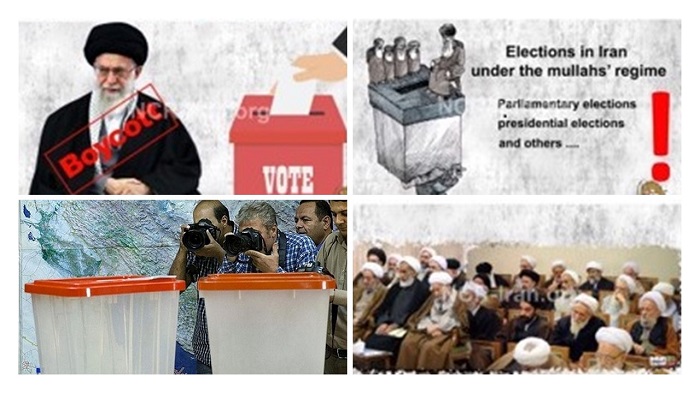
Mullah’s shame elections will be defeated by the Iranians as they boycott it.
Iran’s 41st legislative election is not like any other in the history of the Islamic Republic.
Out of 16033 candidates, more than 55% were discarded by the vetting organ called the Guardian Council and cannot take part in the election. Candidates close to the mullahs’ president Hassan Rouhani are the most touched. Even 90 incumbents members of the Majles – the mullahs’ parliament – have been purged from the next election.
After Khomeini’s death in 1989, the regime has shown to have two distinct political trends internally, one with a penchant towards an open foreign policy along with firmness inside, and the second with a strict fundamentalist approach in every aspect of the political and social life. During nearly three decades, all aspects of political life including foreign policy have had its touch of this dual approach.
On February 21, the #Iran regime will hold its parliamentary election, but this could well be the crisis that tears the regime aparthttps://t.co/tBlJWp3fsO#BoycottIranShamElections #IranProtest #FreeIran2020 @USAdarFarsi pic.twitter.com/74gBoLhoFy
— MEK Iran (Mujahedin-e Khalq) (@MEK_Iran) February 13, 2020
In fact, the Iranian resistance with the Mojahedin-e-Khalq (PMOI/MEK Iran) as its most influential force, rejected the idea of the existence of a real “open” faction inside the regime from the beginning. This regime is shaped around a single main pivot named the supreme leader, Vali-e-faqih. This individual has vast powers according to the mullahs’ constitution based on a fundamentalist interpretation of Shiite Islam by Khomeini. So all individuals, parties and trends permitted to exist inside this system recognize its virtues for them and so can have no love for democratic or pluralistic ideas. But after Khomeini’s death in 1989, the vacuum of power at the top of the regime obliged the regime to stage this dual play in the hope of avoiding a popular uprising against the regime, inside, and gaining a minimum international recognition, outside Iran.
https://www.facebook.com/pmoiranEn/posts/2647931461927608?__xts__%5B0%5D=68.ARCgvyGmJcAd7VXDe_bKwFRpC_AiXJYBV0hYz7Au-M-RYHkP7PJAtWkfOTLRU3C_tSpmA1JrCeQ2bDZhL0uqHZzoHz9yFOFUgyQfRfkgXRpt24vd9XzBvRr1ZKfxZPTac_7ZI5m1PWRthWOBRmSqB3CxdkZQLoy3Z2psYvmeK2dgqerM_KY91RNLSCaqkv2OTLN1Y2Cw4w1K7FJlD_FInkTe5A_cvOSRf5A9S-hxZT5lnr0J9P7W0ZeT-L1EOmMiwA-WdXpWo7Q7xIloTbUmg_MgLyBinxhgL1YTb5iwBtxRkA1W78iLLwVGnaBhTLsPzhExcnPUb71MYGaBgv9Czdp44g&__tn__=-R
From the very beginning, the idea had more buyers outside the country rather than inside. Fierce repression inside the country left little doubt for the population that all figures in the regime were of the same trend. When on a single fatwa (religious order) by Khomeini, more than 30000 political prisoners, mainly MEK Iran member serving time in regime’s prisons were massacred during a few months because of their allegiance to the MEK Iran, the prime minister of the regime at the time, as well as several other high office occupiers, were those to become known, in the future, as prominent figures claiming reform.
The same approach could have been seen when it came to the Iran-Iraq war. All top figures of the regime, military and civilian, stood firm with Khomeini in continuing the war as far and as long as possible, against the interests of the Iranian people.
On the nuclear arms project, figures such as acting president Hassan Rouhani played a vital role in the cover-up of the whole project after it came to light thanks to revelations made by the MEK Iran and its umbrella coalition the National Council of Resistance of Iran (NCRI). Here again, no moderate voices were raised from inside the regime to oppose a very costly project against international law but also against the Iranian people’s interests.
When it comes to terrorism, again everybody inside the regime is on the same line. They defend every terrorist act committed outside the country against opposition members, and more than that they have been, and are, engaged in the planning and execution of such acts. When Rouhani was elected as president in 2013, the Ashraf camp in Iraq where MEK Iran members resided at that time came under missile attack, in a bid to show the new president did not differ from his predecessor Ahmadinejad.
But in the international arena, political interests made many turn their heads, and pretend that they just don’t see. During more than three decades, appeasement was the main policy towards the regime. This policy culminated, in 2015, in a nuclear agreement with Iran called the JCPOA.
An important factor, however, changed the trend. In December 2017, a big uprising by the Iranian people which continued well into 2018 showed the world how the hollow regime’s claims to stability were.
According to mullahs’ president Hassan Rouhani, everything was going fine until the uprising brought the US president Donald Trump “to think the mullahs’ regime was too unstable a partner to deal with in the nuclear deal.” So the Americans withdrew from the JCPOA.
Events that followed thereafter until now have made the policy of appeasement worthless. The ongoing escalation between the US and the regime shows that things have changed on the international scene.
What Khamenei and his regime need now is no longer hollow claims of openness, but rather an iron fist to oppress internal dissent as well as regional challenges put to their regime in countries like Iraq.
The so-called moderates are no longer of use to the regime. They can prove even counter-productive. So the first place for the purge would be the Majles.
With the #Iran parliamentary election, infighting has surged and regime officials reveals new aspects of corruption and bribery in the election’s processhttps://t.co/Sqrd6iAKOA#BoycottIranShamElections #MEK #FreeIran2020 @USAdarFarsi pic.twitter.com/kdSUQN5pR8
— MEK Iran (Mujahedin-e Khalq) (@MEK_Iran) February 11, 2020
For sure, there would no longer be any “moderate” faction in the mullahs’ parliament.
Less sure: such a maneuver is not guaranteed to save the regime from the volatile situation in which it currently is.
